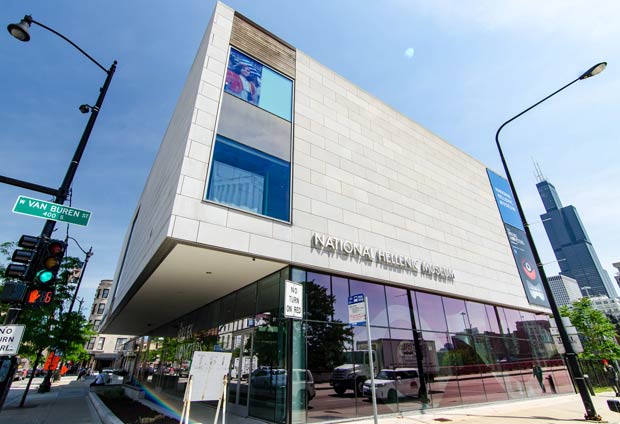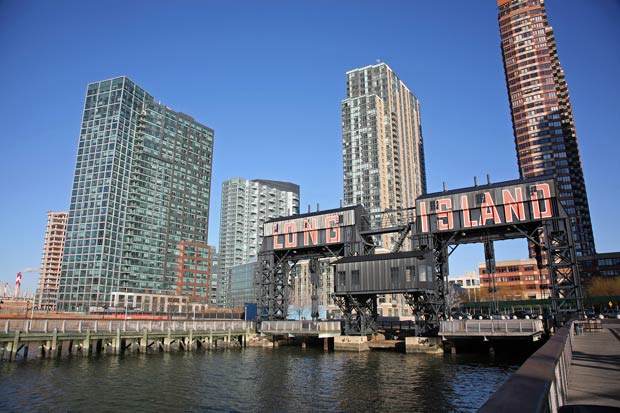γνῶθι σεαυτόν: A Debate Over the Future of Hellenism is Long Overdue

by Endy Zemenides
As the news about Amazon picking Long Island City as one of its two new headquarters locations came through, opposition on social media flashed photos of restaurants closing in Astoria and Greek restaurants being replaced with national chains. People started raising the prospect of ethnic enclaves in Astoria being wiped out.
At the same time, Crain’s Chicago Business published a piece entitled “Can Greektown Survive?” by journalist Ari Bendersky (the piece is available online). Chicago’s Greektown is located in the hottest part of the city’s real estate market – over the past few years the headquarters of McDonald’s and the Midwest headquarters for Google have relocated to the West Loop. If one walks east from Greektown, what was once a relative deadzone along the Chicago River between the central business district and Greektown now hosts a bevy of corporate headquarters buildings – including a new Facebook office, Boeing’s corporate headquarters, and law firms and corporate giants like CNA Insurance that relocated west from along the lakefront. The decline of Chicago’s Greektown may presage the fate of Astoria.
Yet I am not writing to analyze real estate trends, the effects of gentrification or whether America’s great cities are becoming too expensive. There was a line from the Crain’s piece that makes these developments worthy of discussion here. A real estate executive commented on the decline of Greektown by saying: “I don’t know how Greek heritage grows and expands due to the higher rents.” I found the observation thoroughly insulting, as if our traditional dining scene is the key to Greek heritage. (Since most of the Crain’s piece is nonsensical – I’ll dive deeper below – the observation didn’t surprise me). Yet the fate of Greektown – and perhaps Astoria – seem to be part of a greater trend: the future of St. Nicholas – with the fate of the Archdiocese seemingly tied to it – is not a subject that fills anyone with confidence; the historic parish of Holy Trinity in Chicago faces an imminent foreclosure and perhaps extinction; Greek schools are closing around the country; at least one Modern Greek studies program has been eliminated. I could go on and on.

The National Hellenic Museum in the heart of Chicago’s Greek Town, Photo by Eric Allix Rogers
The maxim that failure is the best teacher has become a common theme in stories of corporate, educational and sports success. TED Talks and various books talk about the value of learning from failure. So it is long past due that we start studying our failures if we are to grow as a community. In fact, it is necessary to do so if we are even to survive. And thus I refer you all to one of the inscriptions that was above the Temple of Apollo at Delphi — γνῶθι σεαυτόν or “know thyself”. This month we’ll discuss the fate of our traditional ethnic enclaves and whether that fate teaches us anything of use for our other institutions.
When I practiced law, I worked on developments in and around Greektown for over a decade. For obvious reasons, I have stayed involved in the area. The Crain’s piece may be one of the worst analyses that I have read.
The author tries to overdramatize the present decline in Greektown by designating it a “once-thriving ethnic enclave”. By definition, Greektown hasn’t been an “ethnic enclave” for decades. Greeks haven’t lived there since the University of Illinois at Chicago was built over the famous “Delta” where Greeks settled. Today, neither the owners of Greektown’s businesses nor their employees live in Greektown or its vicinity. Can’t blame zoning or rising rents for this.
At another point the article – all within a few sentences – classifies the closed restaurants as part of the “once vibrant dining options” and then calls the same restaurants “the equivalent of red-sauce Italian—that is, traditional and predictable.” So what is really behind the decline of Greektown restaurants – new residential and commercial developments or a deficient product?
I particularly love the complaint over parking – which has been stated in all kind of ways for three decades. “They put in the buildings and eliminated parking spaces, so nobody can park,” protests one business owner in the piece. Parking in Greektown is better than the hot Randolph Market restaurant row, and it doesn’t seem to be hurting those restaurants. Furthermore, there are more residents, more businesses in and around Greektown (and thus more people that are within walking distance and certainly a wider potential lunch audience) than there were during the “golden age” of a “thriving”/now closed down restaurants. Never mind that Uber/Lyft have really decreased need for parking, a feature that may become even more obsolete once driveless cars come online.

Amazon is picking Long Island City as one of its two new headquarters
Right after Thanksgiving, I was moved to witness a Greektown business owner offer somewhat of an apology to another Greektown land owner who is rarely in Chicago any more. He said “John, you were right about where Greektown was headed if we didn’t get our act together. We didn’t listen and now it is too late.” I offer that anecdote as an admonition: let’s focus on reality instead of personalities. No one person or development doomed Greektown. Demographics and change of tastes, and a complete and utter failure to adapt to these changes, is what doomed Greektown. The same conclusion can be reached regarding the fate of Holy Trinity in Chicago – despite the intellectually fraudulent and dishonest attempt by whoever is left at that parish to pin it on one individual. Neither demographics nor tastes (in cuisine, in worship, in travel, in education) are going to return to what was typical during the age of Greek immigrants. How are we going to change as a result?











0 comments